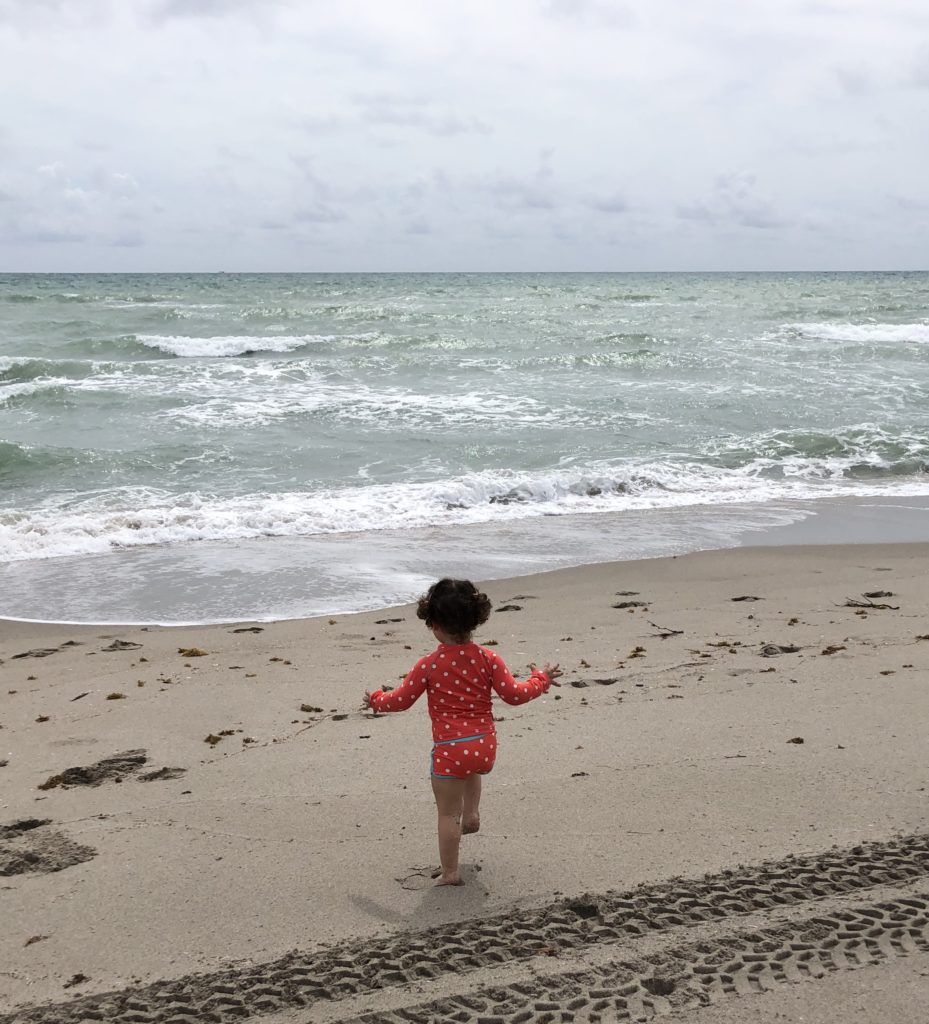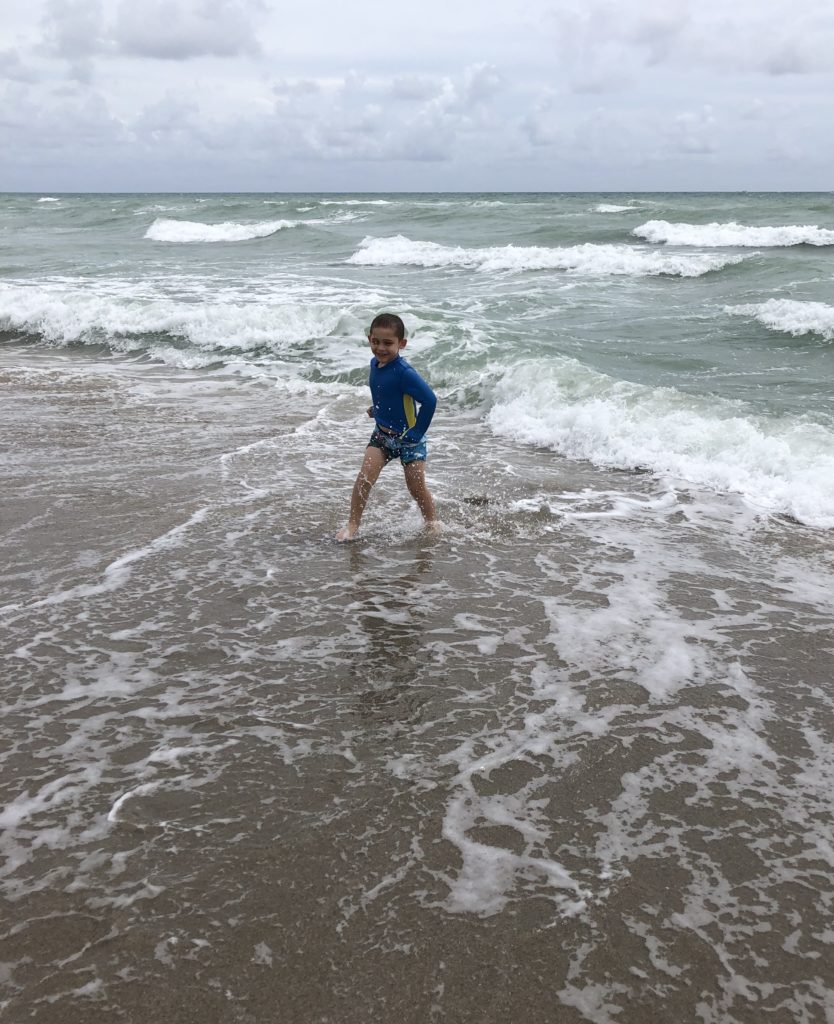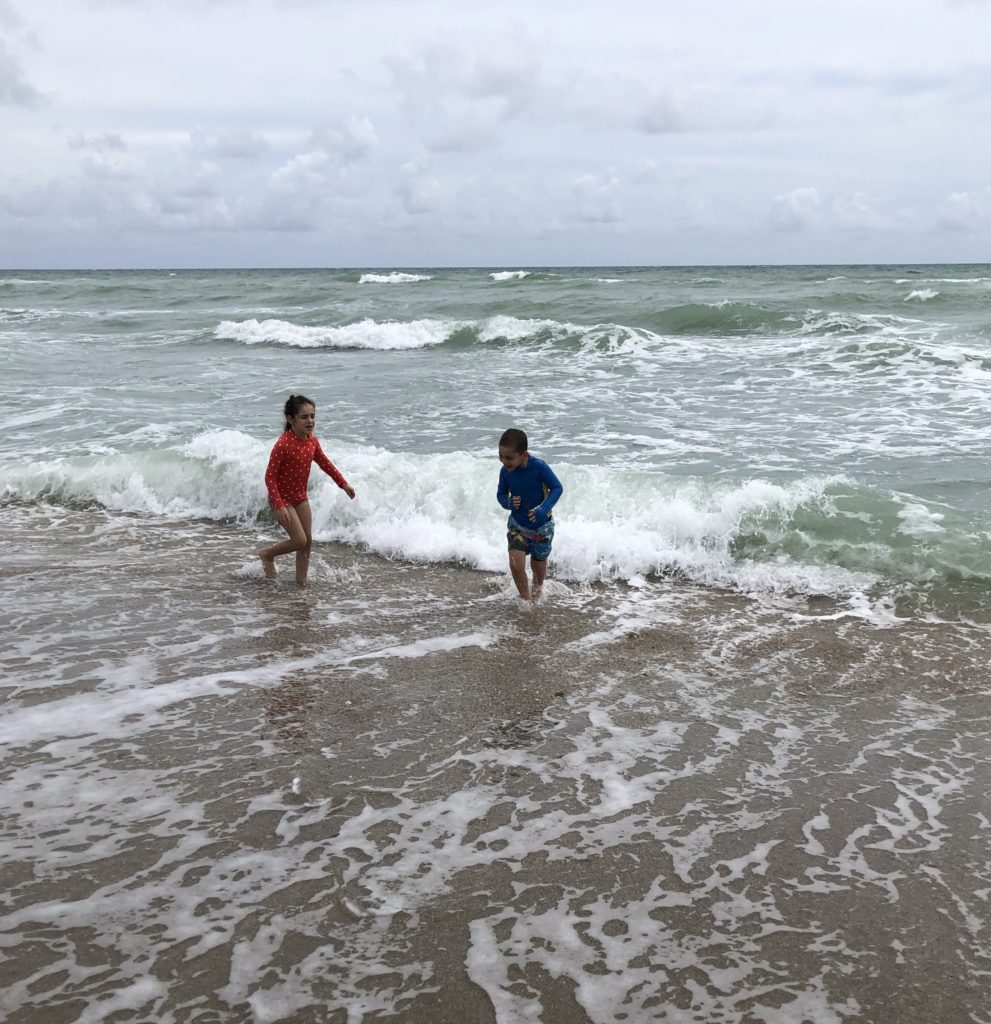


We took another beach trip (Hollywood again, 30 min away) this past weekend. It was post-tropical-depression weather and the ocean was pretty rough, so the kids basically just played at the water’s edge, but it was still fun.
Even though we forgot to bring the sand toys!
However . . . there were a bunch of plastic fragments on the beach (initially I thought they were some natural item and then realize nope — shreds of plastic bags). Depressing.
I also spent time thinking about those on the west coast and how scary it must feel right now.
This post by Feather Factor is in line with many of my own feelings. And I too am determined to do better. We do some things right (hybrid cars – still driving my 10 yo Prius) but other things still need work. We (our country) are currently set up to continue to blow through plastic and styrofoam and gasoline like it’s nothing.
And clearly it’s not.
Anyway . . . about to sneak in a run before a busy day. I am feeling so sore from yesterday’s LIIFT and will probably run at a snail’s pace, but at least it’s movement and outside!
PODCAST REC: 5 episode series Nice White Parents (stories and history of NYC public school integration). It’s a NYT production with the Serial production team, and it’s fascinating.
An astute listener noted I forgot to include the brand recs in yesterday’s podcast! Here’s the list (also going to paste into the show notes retroactively):
Brands/Products Mentioned in yesterday’s BLP:
Trello
Cultivate What Matters (PowerSheets)
PlanHer Paper (product rec: Budget Book)
Simply Gilded (adorable stickers, washi & more!)

8 Comments
Yes, loved Nice White Parents! Definitely gave me some food for thought as my son starts kindergarten and as we join the population of white parents in the public school system here.
I have some comments I want to share on how to help fight climate change, in case it’s helpful to anyone. Nobody can do everything, but here are some of the highest impact things to pick from and start implementing!
If you’re a US citizen, #1 thing is getting your local government and our national government to have people in office who make drastic immediate action on climate a top priority. At the national level, obviously helping to get Biden elected (vote, and consider additional actions: donate, volunteer with the campaign, volunteer at polling places, do postcards to voters, etc) and convincing him to make climate a priority (I donate to the Evergreen Action Project, which is somewhat new so there’s not too much evaluating it but I like what they are trying to do and think they’ve already had an impact on Biden’s plan). I’m still trying to learn more about the local level.
The US needs to be the leader in this transition, and we can be.
At the personal level, it can be hard to know the impact of different actions. Know that getting some of the big structural things in your life right will have the biggest impact. Overall, remember that using less energy is not the goal, it’s emitting less carbon and other greenhouse gases.
-If you own a home, you can get solar panels and as applicances reach end of life (or before) start replacing anything in your house that uses non-electric sources (mostly a furnace being replaced with a heat pump, and your oven/stovetop). Home heating/gas is a large portion of personal carbon footprints, and requires no additional daily action once you’ve structurally changed how you get your energy.
-If you own a car, unless you drive a bunch it’s most effective to keep it til end of life (because manufacturing new vehicles causes emissions) then replace with an electric vehicle. If you have a very long commute, reducing it or using public transit/carpool can also help. Again this is not a daily burden once you’ve made the switch.
-Eat less meat and dairy. Transition some meals to being vegetarian/vegan, replace red meat with lower impact meats like chicken or with fish. Eating plant based is not an all or nothing thing! I personally am “vegan at home”. Our animal agriculture is a surprisingly large portion of our emissions.
-Waste: try to not waste food, and get set up on composting! This is possible even in urban apartments because there are places to drop it off or some cities do pick up. Organic waste in landfills emits greenhouse gases, composting prevents that.
-Flights: this is one of the toughest ones for me! I love traveling. Trying to travel via train/bus rather than plane, have fewer trips, combine trips into longer trips to reduce flights, and see places near home rather than flying can all help. For people who fly a lot or far distances, plane travel is a huge portion of your carbon footprint. I personally want to try and figure out responsible carbon offsets for my plane travel once we can do that again, because each plane flight has such an outsized impact. Not an ideal solution, but like I said we can’t all do everything 🙂
Finally, have hope. We already have the amazing technology that would enable us to slow and stop our emissions and even recapture some carbon for a few decades at a time in our cement, and we’re working on more than might be major breakthroughs. We don’t even need to change our lifestyle (though in some cases that would help too!). We just need to take action, and now is always the best time to start!
What a great comment! Thank you Jess!!
This is amazing, Jess!! I wanted to also recommend a book I loved – it’s called We are the Weather, by Jonathan Safran Foer. He talks a lot about the coexistence of (1) our logical knowledge that we need to take IMMEDIATE action to combat climate change…and (2) our apathy on the topic. He also goes in depth into everyday actions that make a difference (primarily diet stuff), and comes at the topic from the perspective of a parent thinking about what kind of world he’s going to leave for his kid. Made me cry and made me eat less meat!
Thanks for posting about this, Sarah 🙂
Thanks for the recommendation! The cognitive dissonance in everyone (very much including myself) on this topic is wild! Added to my Libby queue 🙂
Hello! I just wanted to pipe up and say thanks so much for all these suggested actions, Jess! It’s incredibly helpful to read them and think about how to prioritize my goals in this area.
And many thanks to Katie for the book recommendation and Sarah for bringing it up in the first place as well!
I like the reader’s comments above and the post you shared. We definitely need to all take responsibility for the environmental problems/climate change and do our part. I’m really trying to work on this, even if it means losing out on convenience – like plastic bags. When we used up the last of our plastic bags, I did not replace them and instead have bought more silicon reusable bags or put things in glass containers. It’s a pain sometimes but I feel like it’s the right thing to do. I’m proud of Minneapolis for providing compost recycling. They implemented that about 3-4 years ago and that has cut down on our garbage – we now only generate one kitchen bag of garbage/week which is not too bad. But Minneapolis makes this doable – it would be hard for everyone to set up their own compost bins (our yard doesn’t have room for it so I can’t see us having our own bin). Now we need a leader who believes in climate change!
I enjoyed Nice White Parents, too. It definitely made me think and yikes I cringed a lot during the first several episodes… My city is trying to work on equity in education and it’s been very very hard. They are re-drawing the districts to try to better utilize space and give disadvantaged kids better opportunities – for example by moving the specialized programs like spanish immersion schools to areas of the city that have a lower socioeconomic profile. Because then those kids are more likely to be able to take advantage of those programs. They are currently located in wealthier areas of the school district, but those parents have the means to get their kids to a specialized school. There’s been a total uproar about this, though. no one wants change and it’s really hard to overcome decades of inequality…
Yes! I really loved We are the Weather as well. I loved both how he presented the urgency of the problem, and how he broke it down to the four big things everyone can do. 1) eat less or no meat 2) have fewer children (I think he put it as have one fewer child than you would) 3) live without a car and 4) fly less. Obviously not everyone is going to do these things and some of them are controversial, but I liked how he explained how each of these would make a huge difference, whereas many of the other things we think we’re doing “right” are not as important. Plus he is a beautiful writer so it was a joy to read.